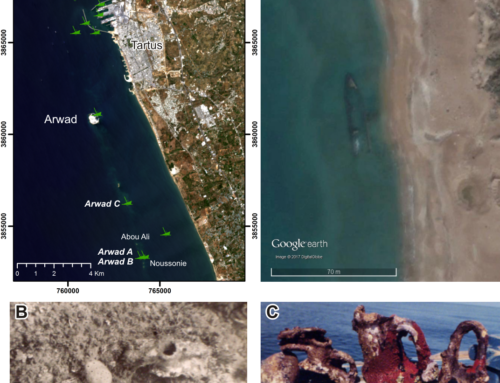Conserving the Maritime Heritage of Syria
Dr Emma Cunliffe
Syria’s cultural heritage, which is amongst the most important in the world, has been devastated by the ongoing conflict. Aleppo has been particularly badly affected, and the Aleppo National Museum contains the finds from the multi-national expeditions conducted as part of the salvage excavations for the Tabqa Dam reservoir, many of which are of international importance – not only to understanding the history of Syria, but to understanding the rise of early civilisations. In addition, the Museum stores the finds from the major coastal Bronze Age site of Ugarit, (a Tentative World Heritage Site) where some of the earliest writing in the world was discovered.
Although the museum has been closed, and the collections (not all of which are documented) have been moved to storage, the conflict places the finds from these sites at extreme risk. Should the conflict move to engulf the location of the store, it is feared the objects will suffer the same fate as the now looted Raqqa Museum. In addition, the current location has been identified as an area at risk from shelling and flooding: the Museum staff must be assisted to protect their collection.
In partnership with Dr Yousef Kanjou – former Director of the Aleppo National Museum – the Aleppo province staff of the Syrian DGAM, and the NGO Heritage for Peace, we proposed to offer training to the staff of the National Museum of Aleppo via Skype in protecting their collection from identified threats, and assistance in documenting the collection, including the provision of equipment. Although Dr Kanjou is no longer resident in Syria, he retains many contacts at the museum, and assisted in the co-ordination of the project. Heritage for Peace have extensive experience in conducting training to heritage professionals working in conflict situations.
However, with great regret, I report the failure of this project.
In July 2014 I was awarded funding from the Honor Frost Foundation for “Conserving the Maritime Heritage of Syria”. The application was supported by the Syrian Directorate General of Antiquities and Museums (DGAM) and was prepared and submitted in partnership with the NGO Heritage for Peace (H4P). The project was intended for H4P to provide emergency conservation training for the National Museum of Aleppo, Syria, together with collections documentation equipment (i.e. cameras, laptops) and emergency funding. The Museum houses collections from Syrian archaeological sites which were inundated by the dam creation projects of the 1970s-1990s.
The money was transferred to H4P who were to purchase the equipment and conduct the training. A meeting took place with DGAM staff in Rimini (co-sponsored by the Council for British Research in the Levant) to try to complete the training plan.
Due to DGAM staff changes and the increasing complexity of the situation in Aleppo, it ultimately proved impossible to develop and deliver the proposed training. With HFF’s support, in April 2015 I agreed with the DGAM to purchase and ship conservation material and equipment, rather than training and documentation equipment, to support the National Museum of Aleppo.
I received a list of requested supplies from the DGAM and determined what could be purchased within the grant. The acquisition of materials was also sponsored by
• discounts from Tile Giant and Kremer Pigments.
• donated goods from VWR, A-Tec Systems and Pegasus Art.
In liaison with the DGAM and supported by the Emergency Safeguarding of Syria’s Cultural Heritage Project (ESSCH) in the UNESCO Beirut Office, I arranged to ship the items to Damascus via Beirut. ESSCH agreed to arrange Lebanese customs clearance. We arranged export licenses and shipping licenses, confirming which materials were hazardous and completing appropriate paperwork for UK, Lebanon and Syrian shipping, all in compliance with UK Charities Commission guidance. Approval was also obtained from various Syrian and Lebanese Ministries. However, this was very time consuming, and shipping costs increased considerably over the period.
The complexities of the Syrian situation, the shipping of hazardous conservation chemicals, and the coordination of the multiple parties involved in the shipping continued to cause delays. Some purchased materials went out of date and were repurchased. Shipping was finally arranged when the riots began in Lebanon in 2019: ESSCH were no longer able to sponsor the shipment. Multiple alternative options were explored, but the 2020 outbreak of COVID-19 has made it impossible to complete the shipment, and many items are again past their date

